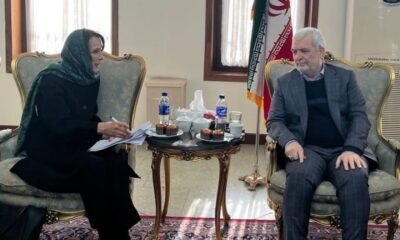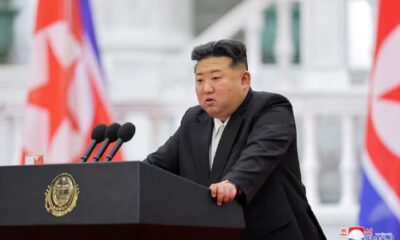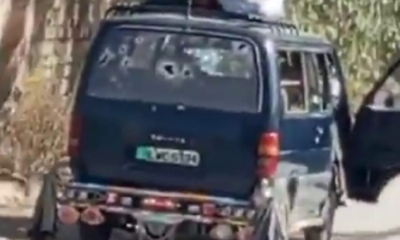World
35 killed in Gaza, 5 in Israel, as violence escalates

Hostilities between Israel and Hamas escalated on Wednesday, with at least 35 killed in Gaza and five in Israel in the most intensive aerial exchanges for years.
Israel carried out hundreds of airstrikes in Gaza into Wednesday morning, as the Islamist group and other Palestinian militants fired multiple rocket barrages at Tel Aviv and Beersheba.
One multi-story residential building in Gaza collapsed and another was heavily damaged after they were repeatedly hit by Israeli air strikes.
Israel said its jets had targeted and killed several Hamas intelligence leaders early on Wednesday. Other strikes targeted what the military said were rocket launch sites, Hamas offices and the homes of Hamas leaders.
It was the heaviest offensive between Israel and Hamas since a 2014 war in Gaza, and prompted international concern that the situation could spiral out of control.
U.N. Middle East peace envoy Tor Wennesland tweeted: "Stop the fire immediately. We're escalating towards a full scale war. Leaders on all sides have to take the responsibility of de-escalation.
"The cost of war in Gaza is devastating & is being paid by ordinary people. UN is working w/ all sides to restore calm. Stop the violence now," he wrote.
Gazans homes shook and the sky lit up from Israeli attacks, outgoing rockets and Israeli air defence missiles intercepting them. At least 30 explosions were heard within a matter of minutes just after dawn on Wednesday.
Israelis ran for shelters or flattened themselves on pavements in communities more than 70 km (45 miles) up the coast and into southern Israel amid sounds of explosions as interceptor missiles streaked into the sky.
In the mixed Arab-Jewish town of Lod, near Tel Aviv, two people were killed after a rocket hit a vehicle in the area. Lod and other mixed towns have been gripped by angry demonstrations over the Gaza violence and tensions in Jerusalem.
Hamas's armed wing said it fired 210 rockets towards Beersheba and Tel Aviv in response to the bombing of the tower buildings in Gaza City. Israel's military says that around a third of the rockets have fallen short, landing within Gaza.
For Israel, the militants' targeting of Tel Aviv, its commercial capital, posed a new challenge in the confrontation with the Islamist Hamas group, regarded as a terrorist organisation by Israel and the United States.
The violence followed weeks of tension in Jerusalem during the Muslim fasting month of Ramadan, with clashes between Israeli police and Palestinian protesters in and around Al-Aqsa Mosque, on the compound revered by Jews as Temple Mount and by Muslims as the Noble Sanctuary.
These escalated in recent days ahead of a – now postponed - court hearing in a case that could end with Palestinian families evicted from East Jerusalem homes claimed by Jewish settlers.
Violence has also flared in the occupied West Bank, where a 26-year-old Palestinian was killed by Israeli gunfire during stone-throwing clashes in a refugee camp near the city of Hebron.
'A VERY HEAVY PRICE'
There appeared no imminent end to the violence. Israeli Prime Minister Benjamin Netanyahu warned that militants would pay a “very heavy” price for the rockets, which reached the outskirts of Jerusalem on Monday during a holiday in Israel commemorating its capture of East Jerusalem in a 1967 war.
The outbreak of hostilities led Netanyahu's political opponents to suspend negotiations on forming a coalition of right-wing, leftist and centre-left parties to unseat him after an inconclusive March 23 election.
Opposition leader Yair Lapid has three weeks left to establish a government, with a new election - and another chance for Netanyahu to retain power - likely if he fails.
The Arab League, some of whose members have warmed ties with Israel over the last year, accused it of “indiscriminate and irresponsible” attacks in Gaza and said it was responsible for “dangerous escalation” in Jerusalem.
Hamas named its rocket assault "Sword of Jerusalem", seeking to marginalise Palestinian President Mahmoud Abbas and to present itself as the guardians of Palestinians in Jerusalem.
The militant group's leader, Ismail Haniyeh, said Israel had “ignited fire in Jerusalem and Al-Aqsa and the flames extended to Gaza, therefore, it is responsible for the consequences."
Haniyeh said that Qatar, Egypt and the United Nations had been in contact urging calm but that Hamas’s message to Israel was: "If they want to escalate, the resistance is ready, if they want to stop, the resistance is ready."
The White House said on Tuesday that Israel had a legitimate right to defend itself from rocket attacks but applied pressure on Israel over the treatment of Palestinians, saying Jerusalem must be a place of coexistence.
The United States was delaying U.N. Security Council efforts to issue a public statement on escalating tensions because it could be harmful to behind-the-scenes efforts to end the violence, according to diplomats and a source familiar with the U.S. strategy. State Department spokesman Ned Price urged calm and “restraint on both sides”, saying: “The loss of life, the loss of Israeli life, the loss of Palestinian life, It’s something that we deeply regret.”
He added: "We are urging this message of de-escalation to see this loss of life come to an end."
PLUMES OF BLACK SMOKE
Israel said it had sent 80 jets to bomb Gaza, and dispatched infantry and armour to reinforce the tanks already gathered on the border, evoking memories of the last Israeli ground incursion into Gaza to stop rocket attacks in 2014.
More than 2,100 Gazans were killed in the seven-week war that followed, according to the Gaza health ministry, along with 73 Israelis, and thousands of homes in Gaza were razed by Israeli forces.
Video footage on Tuesday showed three plumes of thick, black smoke rising from a 13-story Gaza residential and office block as it toppled over after being demolished by Israeli airstrikes.
The Israeli military said the building, in Gaza City's Rimal neighbourhood, housed "multiple" Hamas offices, including ones for military research and development and military intelligence.
The existence of one Hamas office, used by political leaders and officials dealing with the news media, was widely known locally.
Residents in the block and the surrounding area had been warned to evacuate the area before the airstrike, according to witnesses and the Israeli military.
A second residential and office building in the same neighbourhood was heavily damaged in Israeli attacks shortly before 2 a.m. on Wednesday. Residents and journalists working in the building had already left.
On Tuesday Gaza health ministry officials put the death toll at 32, but a Hamas-affiliated radio station later said three more people, including a woman and a child, were killed shortly before 2 a.m. on Wednesday in an Israeli airstrike on an apartment above a restaurant.
Israeli political leaders and the military said they had killed "dozens" of militants, and hit buildings used by Hamas.
Defence Minister Benny Gantz said Israel had carried out "hundreds" of strikes, and that "buildings will continue to crumble."
Gaza's health ministry said that of the people reported dead, 10 were children and one was a woman.
Israel’s Magen David Adom ambulance service said a 50-year-old woman was killed when a rocket hit a building in the Tel Aviv suburb of Rishon Lezion, and that two women had been killed in rocket strikes on Ashkelon.
World
North Korea’s Kim accuses US of stoking tension, warns of nuclear war

North Korean leader Kim Jong Un has accused the United States of ramping up tension and provocations, saying the Korean peninsula has never faced a greater risk of nuclear war, state media KCNA said on Friday.
The comments came amid international criticism over increasingly close military co-operation between Pyongyang and Moscow, and assertions that North Korea sent more than 10,000 troops to Russia to support its invasion of Ukraine, Reuters reported.
Previous negotiations with Washington have only highlighted its "aggressive and hostile" policy toward North Korea, Kim said in a speech at a military exhibition in Pyongyang, the capital, the KCNA news agency said.
"Never before have the warring parties on the Korean peninsula faced such a dangerous and acute confrontation that it could escalate into the most destructive thermonuclear war," he said on Thursday.
"We have already gone as far as we can on negotiating with the United States," he said, adding that the talks had only shown its aggressive and hostile policy toward North Korea could never change.
North Korean state media have not yet publicly mentioned the re-election of Donald Trump, who held three unprecedented meetings with Kim during his first term, in Singapore, Hanoi, and at the Korean border, in 2018 and 2019.
But their diplomacy yielded no concrete outcome due to the gap between U.S. calls for North Korea to abandon its nuclear weapons and Kim's demands for sanctions relief.
Trump has long touted his ties with Kim, saying last month the two countries would have had "a nuclear war with millions of people killed", but he had stopped it, thanks to his ties with the North's leader.
Hong Min, a research fellow at the Korea Institute for National Unification in Seoul, said Kim could be trying to underscore the North's nuclear capabilities ahead of Trump's second term, while leaving the door open for diplomacy.
"He might be suggesting Trump should show his 'willingness to co-exist' before re-opening any talks and calling for a change in the U.S. hostile attitude," Hong said.
MILITARY EXHIBITION
Kim also called for developing and upgrading "ultra-modern" versions of weaponry, and vowed to keep advancing defence capabilities to bolster the North's strategic position, KCNA said.
Strategic and tactical weapons were on display at the event, called the Defence Development Exhibition.
KCNA pictures showed the Hwasong-19 and 18 intercontinental ballistic missiles, the Chollima-1 rocket used in a successful satellite launch in November 2023, and the Saetbyol-9 multi-purpose attack drone, which resembles the U.S. Reaper.
Hong said the pictures also included several weapons needed by or presumed to already have been supplied to Russia for its war in Ukraine, such as 240mm multiple rocket launchers, self-propelled howitzers, anti-tank systems and drones.
North Korea has shipped additional arms to Russia, the South's lawmakers said on Thursday, after being briefed by the national intelligence agency.
Last year, when he was defence minister, Russian Security Council Secretary Sergei Shoigu accompanied Kim to a defence fair that showcased missiles and weapons.
Last week, Kim urged the North's military to improve its war-fighting capabilities, blaming the United States and its allies for stoking tension to "the worst phase in history" and calling the Korean peninsula "the world's biggest hotspot".
World
ICC issues arrest warrants for Israel’s Netanyahu, Gallant and Hamas leader
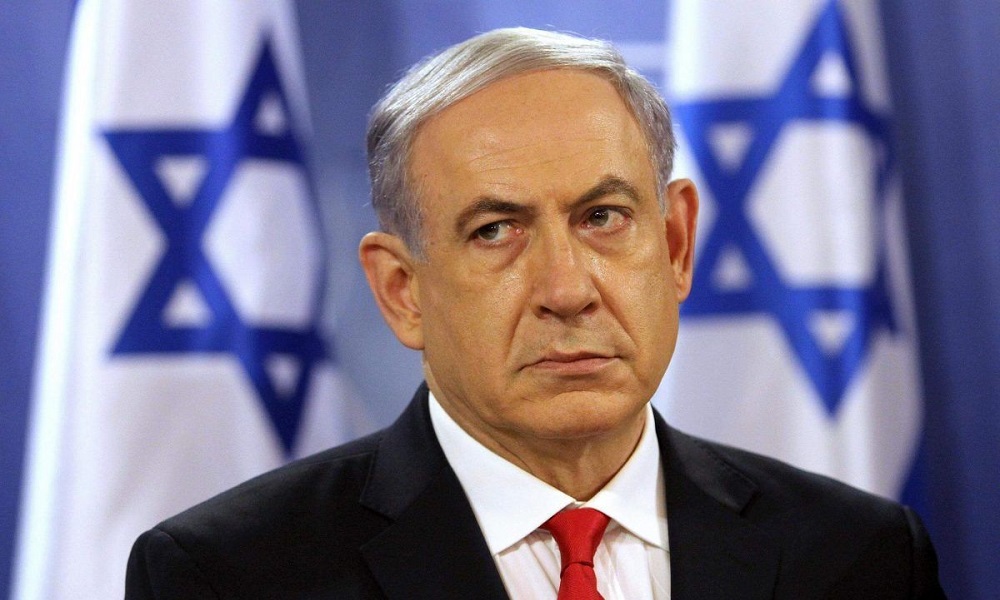
Judges at the International Criminal Court have issued arrest warrants for Israeli Prime Minister Benjamin Netanyahu and his former defence chief, as well as a Hamas leader, Ibrahim Al-Masri, for alleged war crimes and crimes against humanity, Reuters reported on Thursday afternoon.
The move comes after the ICC prosecutor Karim Khan announced on May 20, that he was seeking arrest warrants for alleged crimes connected to the Oct.7, 2023 attacks on Israel by Hamas and the Israeli military response in Gaza.
The ICC said Israel's acceptance of the court's jurisdiction was not required.
Israel has rejected the jurisdiction of the Hague-based court and denies war crimes in Gaza.
Israel has said it killed Al-Masri, also known as Mohammed Deif, in an airstrike but Hamas has neither confirmed nor denied this.
World
US vetoes UN Security Council resolution on Gaza ceasefire

The United States on Wednesday vetoed a U.N. Security Council resolution for a ceasefire in Gaza, drawing criticism of the Biden administration for once again blocking international action aimed at halting Israel's war with Hamas.
The 15-member council voted on a resolution put forward by 10 non-permanent members that called for an "immediate, unconditional and permanent ceasefire" in the 13-month conflict and separately demanded the release of hostages, Reuters reported.
Only the U.S. voted against, using its veto as a permanent council member to block the resolution.
Robert Wood, deputy U.S. ambassador to the U.N., said Washington had made clear it would only support a resolution that explicitly calls for the immediate release of hostages as part of a ceasefire.
"A durable end to the war must come with the release of the hostages. These two urgent goals are inextricably linked. This resolution abandoned that necessity, and for that reason, the United States could not support it," he said.
Wood said the U.S. had sought compromise, but the text of the proposed resolution would have sent a "dangerous message" to Hamas that "there's no need to come back to the negotiating table."
Israel's campaign in Gaza has killed nearly 44,000 people and displaced nearly all the enclave's population at least once. It was launched in response to an attack by Hamas-led fighters who killed 1,200 people and captured more than 250 hostages in Israel on Oct. 7, 2023.
Members roundly criticized the U.S. for blocking the resolution put forward by the council's 10 elected members: Algeria, Ecuador, Guyana, Japan, Malta, Mozambique, South Korea, Sierra Leone, Slovenia and Switzerland.
"It is deeply regretted that due to the use of the veto this council has once again failed to uphold its responsibility to maintain international peace and security," Malta's U.N. Ambassador Vanessa Frazier said after the vote failed, adding that the text of the resolution "was by no means a maximalist one."
"It represented the bare minimum of what is needed to begin to address the desperate situation on the ground," she said.
Food security experts have warned that famine is imminent among Gaza's 2.3 million people.
U.S. President Joe Biden, who leaves office on Jan. 20, has offered Israel strong diplomatic backing and continued to provide arms for the war, while trying unsuccessfully to broker a ceasefire deal between Israel and Hamas that would see hostages released in exchange for Palestinians held by Israel.
After blocking earlier resolutions on Gaza, Washington in March abstained from a vote that allowed a resolution to pass demanding an immediate ceasefire.
A senior U.S. official, who briefed reporters on condition of anonymity ahead of Wednesday's vote, said Britain had put forward new language that the U.S. would have supported as a compromise, but that was rejected by the elected members.
Some members were more interested in bringing about a U.S. veto than compromising on the resolution, the official said, accusing U.S. adversaries Russia and China of encouraging those members.
'GREEN LIGHT'
France's ambassador Nicolas de Riviere said the resolution rejected by the U.S. "very firmly" required the release of hostages.
"France still has two hostages in Gaza, and we deeply regret that the Security Council was not able to formulate this demand," he said.
China's U.N. ambassador, Fu Cong, said each time the United States had exercised its veto to protect Israel, the number of people killed in Gaza had steadily risen.
"How many more people have to die before they wake up from their pretend slumber?" he asked.
"Insistence on setting a precondition for ceasefire is tantamount to giving the green light to continue the war and condoning the continued killing."
Israel's U.N. ambassador Danny Danon said ahead of the vote the text was not a resolution for peace but was "a resolution for appeasement" of Hamas.
"History will remember who stood with the hostages and who abandoned them," Danon said.
-

 Sport4 days ago
Sport4 days agoAbu Dhabi’s thrilling T10 tournament just days away
-

 World4 days ago
World4 days agoBiden allows Ukraine to use US arms to strike inside Russia
-

 Sport4 days ago
Sport4 days agoAfghanistan beat UAE by 169 runs in U19 tri-series
-

 Latest News3 days ago
Latest News3 days agoTajikistan trumps Afghanistan 3-1 in football friendly
-
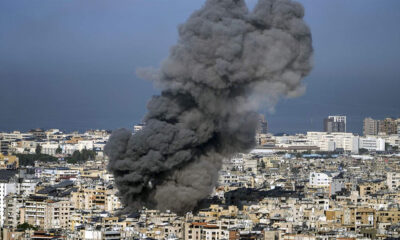
 World3 days ago
World3 days agoLebanon, Hezbollah agree to US proposal for ceasefire with Israel, Lebanese official says
-
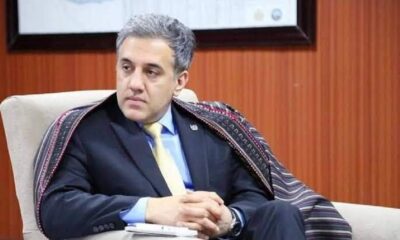
 Latest News4 days ago
Latest News4 days agoTwo Afghan diplomats posted to Germany under former government resign
-
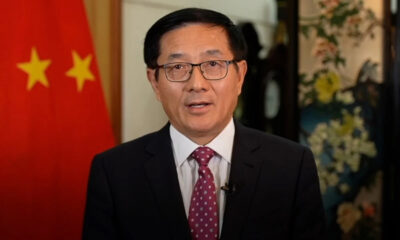
 Latest News4 days ago
Latest News4 days agoChina’s envoy says Beijing never interferes in Afghanistan’s internal affairs
-
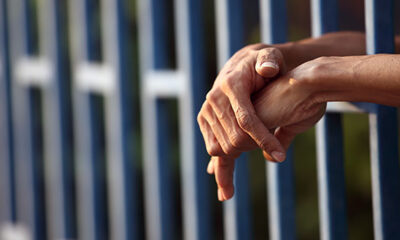
 Latest News4 days ago
Latest News4 days agoSaudi Arabia executed 101 people, including three Afghans this year


